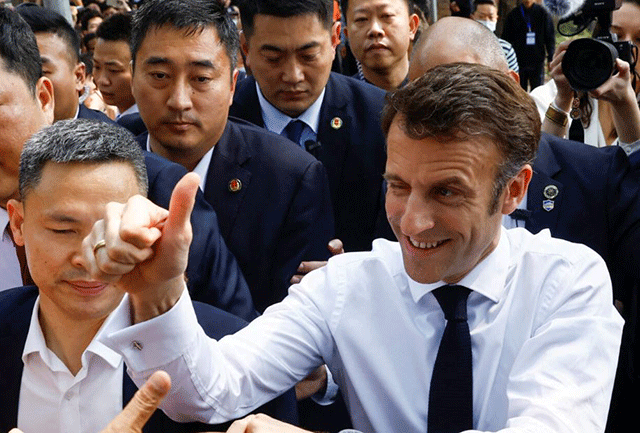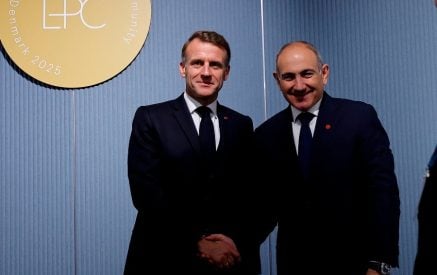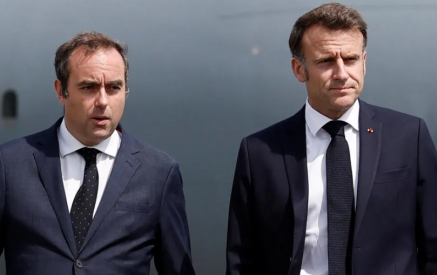Written by Eldar Mamedov
US China hawks can’t demand that Europe arm up for its own defense and remain a vassal to Washington.
There’s a certain déjà vu about it: another of those periodic rounds of French-bashing in Washington.
Read also
This time the trigger was French President Emmanuel Macron’s interview about his recent meetings with Chinese President Xi Jinping in Beijing. In it, he had the temerity to suggest that Europe should not become anybody’s vassal, and that it should put its own interests first in the context of the looming confrontation between the United States and China.
The outrage sparked by his remarks is completely unjustified given what Macron actually said as opposed to what has been imputed to him. Worse, the mindset behind it shortsightedly ignores Washington’s long-term strategic interest in persuading Europe to increase its military budgets to be able to defend itself; that is, essentially advancing toward Macron’s concept of strategic autonomy.
One of the champions of outrage has proved to be Rep. Chris Smith (R-N.J.), the chair of the Congressional Executive Commission on China. He called for the U.S. to reassess its posture toward France as Paris is apparently “committed to abandoning democratic nations in favor of a brutal communist regime,” and described Macron’s remarks as a “seeming betrayal of democratic Taiwan.”
For his part, Rep. Mike Gallagher (R-Wis.), who chairs the Select Committee on the Chinese Communist Party, was not to be outdone: for him, Macron was sending “the signal that the West will stand idly by the Chinese threat to Taiwan” which would “invite aggression.” And with no hint of irony, Liana Fix of the establishment Council on Foreign Relations, tweeted the alarm that Macron’s refusal to become a “vassal” of the United States “brutally undermined his credibility as leader in Europe”.
None of this hyperbolic rhetoric is even remotely warranted. If one reads Macron’s original interview, there isn’t anything in it that should be controversial. Macron speaks as the leader of a major European country, one that carries a unique weight as the only EU member of the United Nations Security Council and the EU’s only nuclear power. As one of the engines of the world’s largest trade bloc, it shouldn’t surprise anyone that a French president would speak in terms of a broader European interest. In fact, it is only natural given the historic role of the French-German tandem in leading the EU.
The remark about vassalage was widely misunderstood in the U.S. The context of his remarks makes clear that he believes Europe should be no one’s vassal, including Washington’s. He spoke of the EU as being the “third pole” in the emerging bipolar U.S.— Chinese standoff — one with an ability to set its own agenda and muster resources to match it in practice.
That, in essence, means implementing Europe’s strategic autonomy, which Macron has been championing since he first assumed office in 2017. It does not by definition imply that Europe or France should be in conflict with U.S. views and policies. But it does mean that the U.S. should take greater diplomatic pains to win Europe over – again, hardly a controversial position for the president of a major European nation.
Moreover, those who took issue with Macron’s remarks about the speed with which the U.S.-China confrontation is taking place missed the point — what he said did not even remotely imply that the EU should abandon Taiwan to its fate, but rather that the EU should manage the competition with China on its own terms, and at its own pace.
Notably, he advocated for Europe’s autonomy not only with regard to Washington’s more confrontational approach to Beijing, but also with respect to “Chinese overreaction.” That doesn’t mean selling out Taiwan, Western allies and democratic values. The clear message was that Europe is not interested in an escalation of tensions over Taiwan, a position that hardly makes him the caricatured Neville Chamberlain that he is made to be. Rather, it sounds a healthy cautionary note about the necessity to defuse tensions and prevent another catastrophic war from erupting.
Likewise, Macron’s remarks about the need for the EU not to simply go along with the extraterritoriality of the U.S. dollar is not part of some twisted anti-U.S. plot. Rather, it is a reaction to Washington’s own addiction to extraterritorial sanctions as a geopolitical weapon: when the former president Donald Trump unwisely withdrew from the nuclear agreement with Iran, known as the JCPOA, he used the dollar’s preponderant financial position to punish any commerce with other countries or private companies based on those countries, including France, would conduct with Iran.
That policy has led to the demise of the JCPOA and Iran’s steady progress toward a theoretical nuclear weapons capability which poses a greater threat to European, and French security than to the U.S. It is thus hardly surprising that Macron should wish for the EU, including France, to insure itself against more such risks in the future.
What U.S. policymakers should wish for is not for Europe’s strategic autonomy to be rejected, but, on the contrary, for it to be implemented and consolidated. The knee-jerk reaction to any hint of European independence from the U.S., however modest in practice, is incompatible with the expectations for the wealthy continent to end its security free-riding, a source of irritation and frustration in Washington since Dwight Eisenhower was president.
Washington needs to end this ambivalence: it is not possible to, on the one hand, loudly demand that Europeans assume more responsibility for their defense and, on the other, loudly squawk whenever they appear to be moving in that direction. Ultimately, strategic autonomy serves Washington’s interests: an EU that is fully capable of taking care of its own security would permit the U.S. to concentrate its resources in other theaters, such as the Asia-Pacific.
Washington’s real problem is not so much that Macron went too far in his musings on Europe’s strategic autonomy but rather that he may not have sufficient clout to carry out his vision in practice. Contrary to his hyperbolic image as the “leader of Europe” as many of his critics depict him, he is the president of only one European country, however powerful. The confidence that he expressed in the interview that the ideological debate over strategic autonomy has been won is premature: for Poland and the Baltic states, for example, the concept is still an anathema as it is seen in those countries as undermining NATO.
To compound the difficulties, Macron’s own standing in France has been undermined by the mass demonstrations against his plans to reform the pension system. He is much weaker today than he was just a couple of months ago.
Those in the U.S. who profess to care deeply about the Chinese threat should think twice about the targets on which they choose to direct their own anger and frustrations.





























































